Visiting Ancient Olympia - everything you need to know
I have always wanted to visit this sacred site of Ancient Greece with its great fame and impressive statues created by the most famous sculptors. There is the Panhellenic sanctuary of Zeus whose scope today is global because the Olympic Games were held there in honor of the ancient god from their inception in 776 BC until their extinction in 393 AD. In this article you will see drone photos and information about all the famous sights.
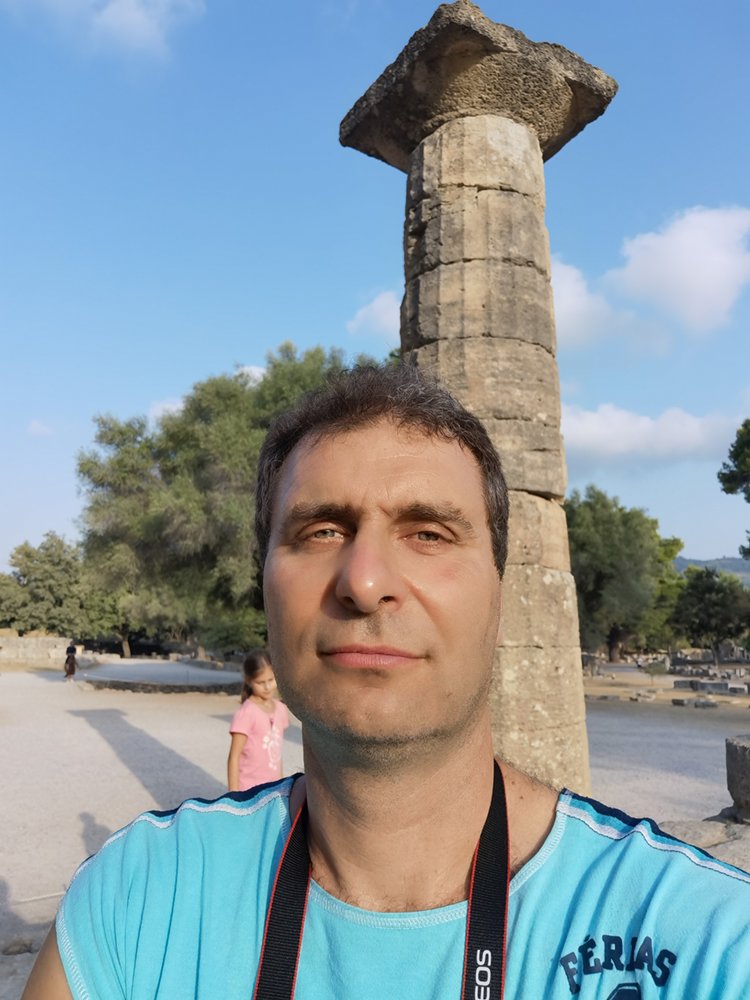
What the visit includes
- Archaeological Museum
- Archaeological Site
- Museum of the History of the Ancient Olympic Games
Let's start with the basics:
Entrance / ticket
- the ticket is a single ticket, i.e. valid for the three above together
- it costs € 20. The reduced ticket costs € 10
- up to 25 years old the entrance is free for EU citizens and up to18 for non EU
- it is valid for one visit i.e. you visit them all at once. Not half in the morning and the rest in the afternoon. The ticket indicates the time and as soon as you enter each place a check is made. If it was issued e.g. at 10:00 and it is 16:00 then you will not be allowed entry
However I have one objection here, on the official website https://hhticket.gr it states that:
«The time you select applies to the Museum of Ancient Olympia»
I visited the museums and because it was approaching noon and the temperature was rising I left the archaeological site for the afternoon. As soon as I returned the employee at the entrance of the archaeological site informed me of what I mention above and I could not enter. Coincidentally the next in line, a foreign couple, had made the same mistake as me. I checked it on the website and found that it does not mentio that the ticket is “valid for one visit” and that is exactly what the employee said.
I booked the tickets online on the above website but I should have printed them out and since I didn’t have them the employees offered to print them out. The children also have a ticket that says 0 €.
For the opening hour, make sure to check the official website because it changes depending on the season.
The visit to all of them lasts at least 3 hours. Be sure to bring water and a hat if the sun is shining hot.
Drone footage of part of the archaeological site
Below is a list of the hotels I recommend you to stay at:
- (€€) Europa Hotel Olympia (⭐ 9.4) within walking distance to the archaeological site. With spacious rooms, a swimming pool and a rooftop restaurant it will make your stay unforgettable.
- (€€) Bacchus Hotel (⭐ 8.9) a top choice for stay in nearby Ancient Pisa in a very nice spot with mountain views, a swimming pool and a restaurant with delicious dishes
- (€) Kronio Hotel (⭐ 8.4) with a very good quality / price ratio with quality breakfast, a short distance from the archaeological site
Archaeological museum
Here you will explore the history and archaeological findings of Ancient Olympia from prehistory to the Roman era. The museum's statues are among the most famous in Greece and adorn history textbooks. These are:
- Victory of Paeonius or Nike of Paionios a dedication of the Messenians and Nafpaktians to Zeus after their victory over the Lacedaemonians in the Archidamian War (c. 421 BC). The sculptor is Paeonius from Mende in Chalkidiki. The posture of the body gives the impression of flight and triumphant descent from Olympus to proclaim victory
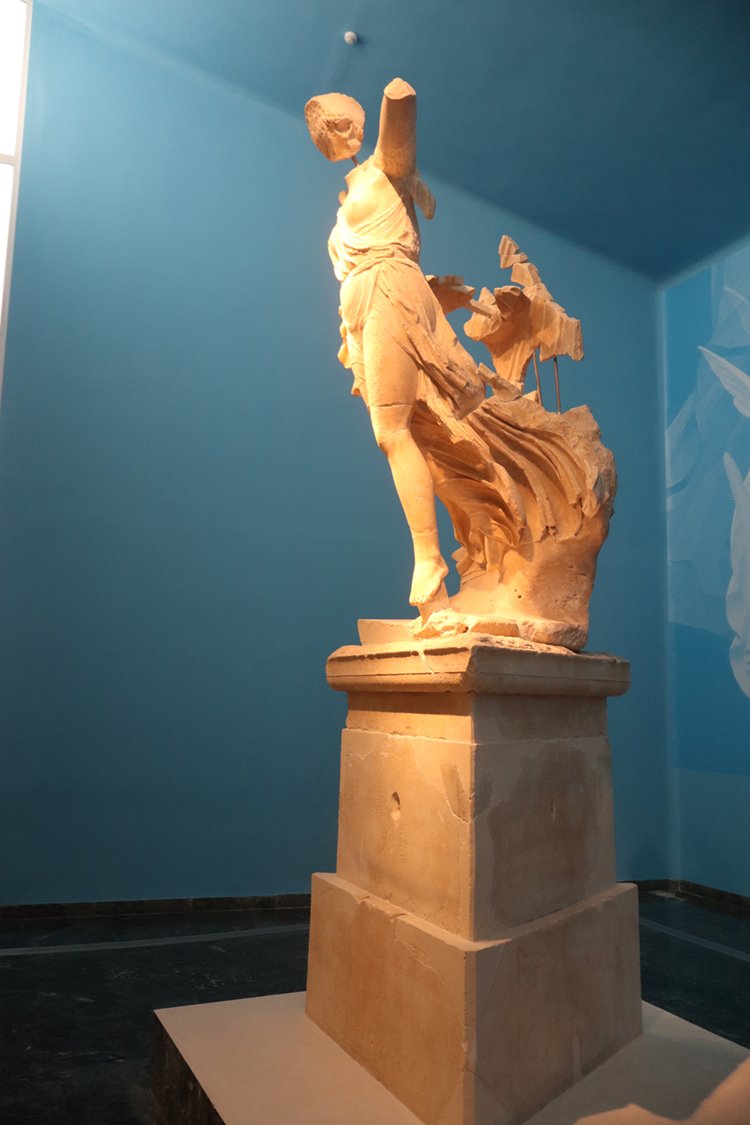
- Hermes of Praxiteles the messenger of the gods carries the little Dionysus to the Nymphs who will raise him. He rests on the way leaving his robe on a tree trunk. In his raised hand he probably held a bunch of grapes, a symbol of the future god of wine, which Dionysus tries to reach with his hand
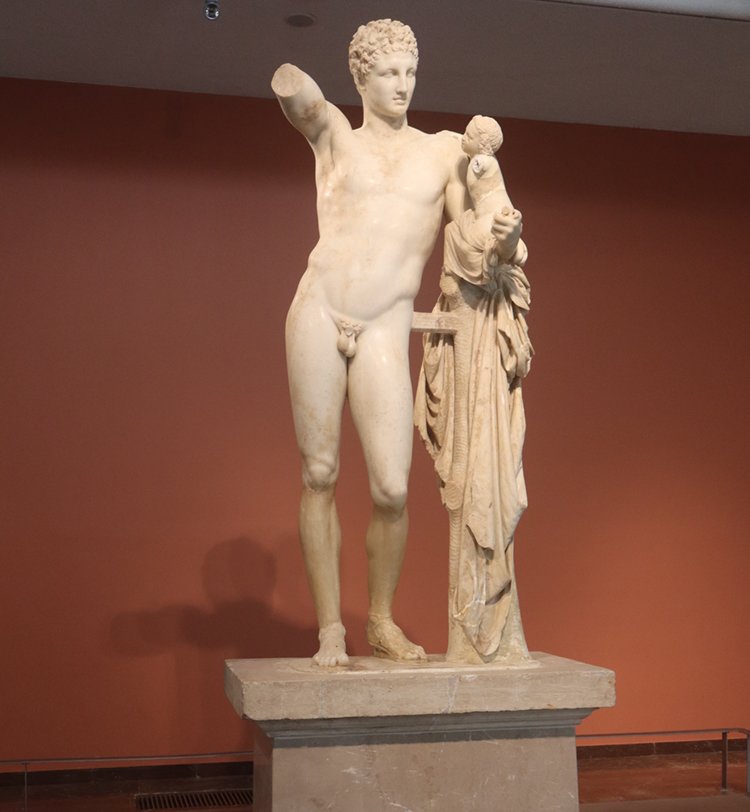
- West pediment of the Zeus Temple in the center Apollo, calmly standing amidst a clash between Lapiths and Centaurs. The face of Apollo is a familiar figure to the elderly as it was depicted on the old thousand drachma banknote
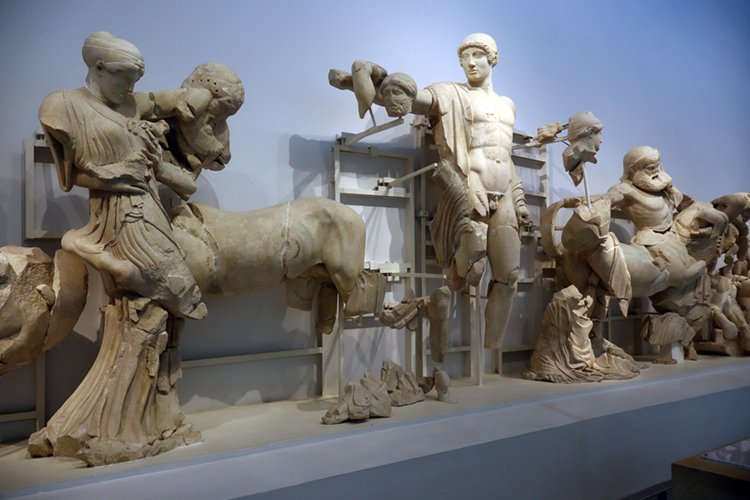
- Eastern pediment of the Zeus Temple central figure is Zeus, the sculpture is about the dispute for dominance in the sanctuary between the Elis and Pisates. To the right of Zeus is the couple Oenomaus - Steropes and to the left Pelops - Hippodamia
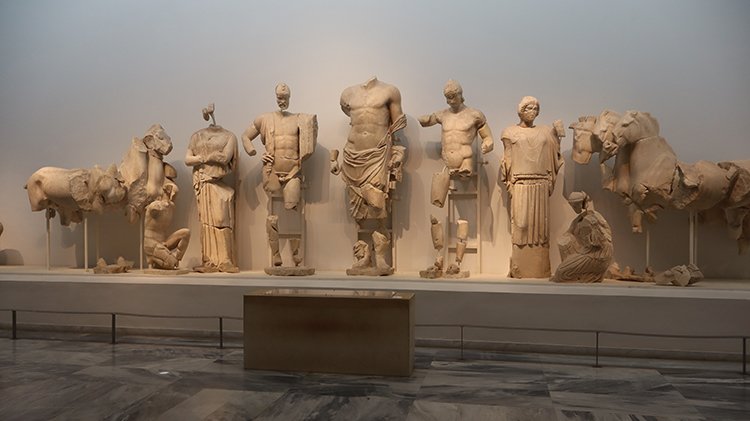
In front of these statues people are enthusiastic and take photos of themselves profusely and even pose for souvenir photos. Of course, there are many more interesting exhibits but I think the museum is small for such an important ancient cult center.
Read more: At the magical beach Kato Samiko in Ancient Olympia [VIDEO]
Archaeological site
The best way to visit the archaeological site is with a guide so that you understand what you are seeing. I recommend the tour with headphones and virtual reality glasses so that you can see the ruins as they were in ancient times.
If you are a group og friends you can get a private tour guide.
Loaded with temples, dedications and sports facilities the most important being the Hera temple, the Zeus temple and the Stadium where the Games were held. Let's go see them one by one along with the other buildings.
- Gymnasium a long, narrow building, a training area for track and field and pentathlon athletes. The javelin and discus athletes used to get trained in its outdoor area
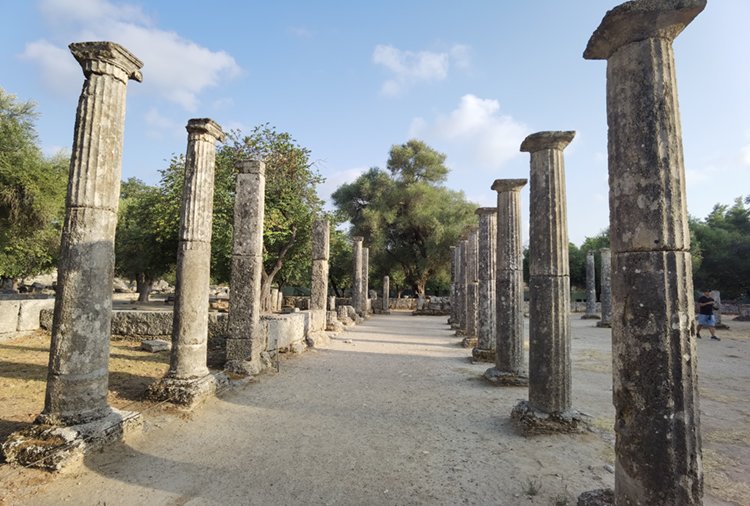
- Palaestra a square building with a courtyard surrounded by columns. Here athletes trained in wrestling, boxing and jumping. Teachings and speeches by philosophers, orators and poets also were taking place
- Philippeion a circular temple dedicated to the Macedonian kings. It's construction begun by Philip II in 338 BC after his victory at the Battle of Chaeronea and was completed under Alexander the Great
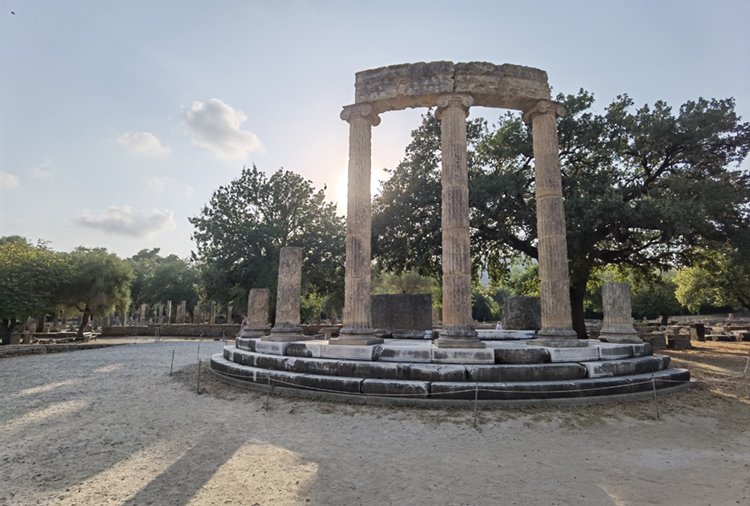
- Temple of Hera the oldest building of the sanctuary was built in the early 6th century BC and four columns have been restored. Architectural parts of the temple are exhibited in the museum. In honor of the goddess the Heraia athletic games were held which were only for women
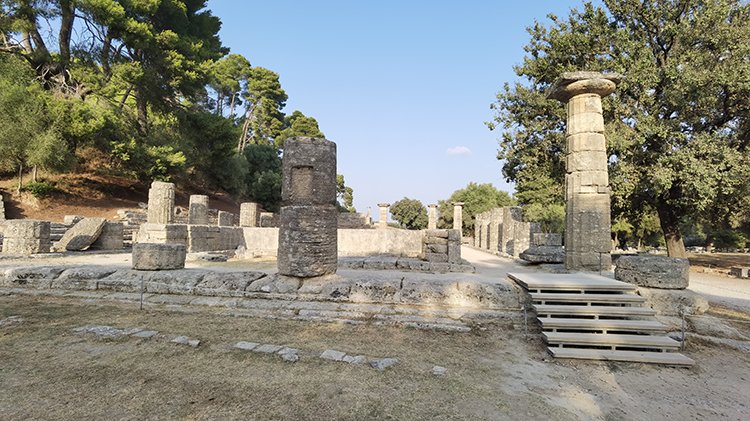
- Temple of Zeus the most important sanctuary, inside was the 12-meter-high gold and ivory statue of Zeus one of the seven wonders of antiquity. It was a magnet for all of Greece, everyone had to come see it once in their lives. The rich sculptural decoration is kept in the central hall of the Archaeological Museum. The upright column has been restored. Behind the temple is the base of the Victory of Paeonius
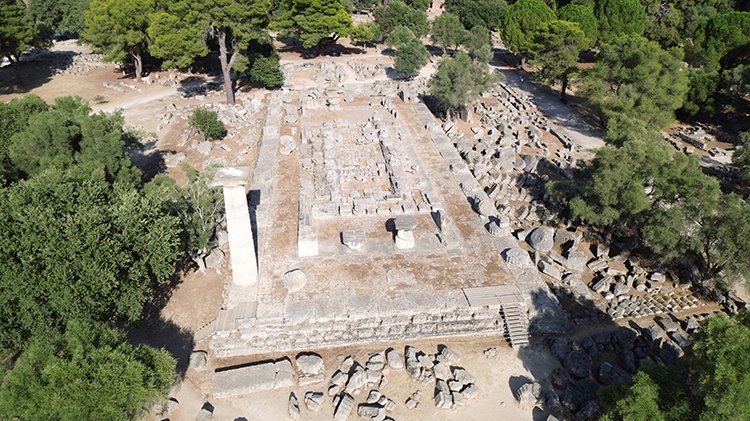
- Stadium the venue for the Olympic Games and the Heraia, connected to the sacred area by the stoa. It had a capacity of 45,000 seats and the only seats that survive are those of the Hellanodics, judges and referees of the Games in the middle right of the Stadium. The distance between the two valves is one Olympic stadium (192.27 meters)
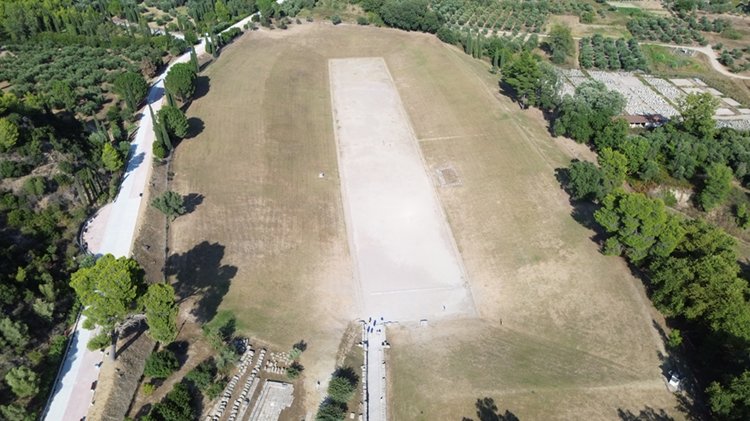
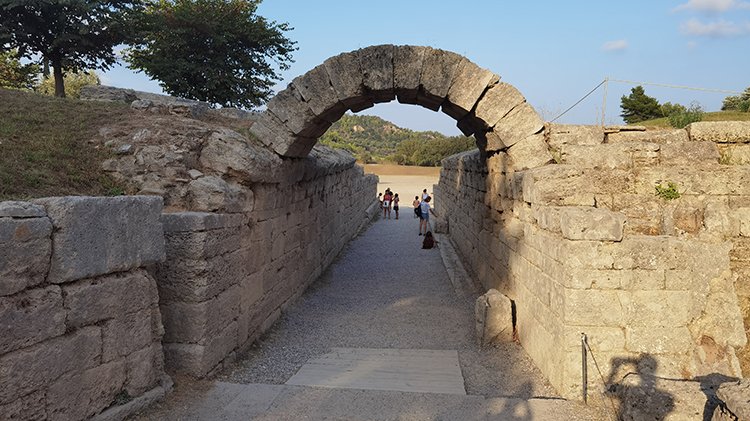
The stoa leading to the Stadium
- Leonidaio a square building where officials were hosted. It was built around 330 BC by Leonidas from Naxos as sponsor and architect
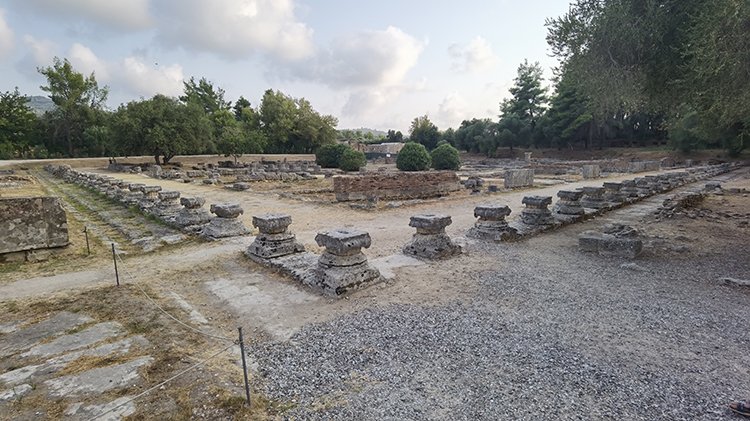
Below is a list of the hotels I recommend you to stay at:
- (€€) Europa Hotel Olympia (⭐ 9.4) within walking distance to the archaeological site. With spacious rooms, a swimming pool and a rooftop restaurant it will make your stay unforgettable.
- (€€) Bacchus Hotel (⭐ 8.9) a top choice for stay in nearby Ancient Pisa in a very nice spot with mountain views, a swimming pool and a restaurant with delicious dishes
- (€) Kronio Hotel (⭐ 8.4) with a very good quality / price ratio with quality breakfast, a short distance from the archaeological site
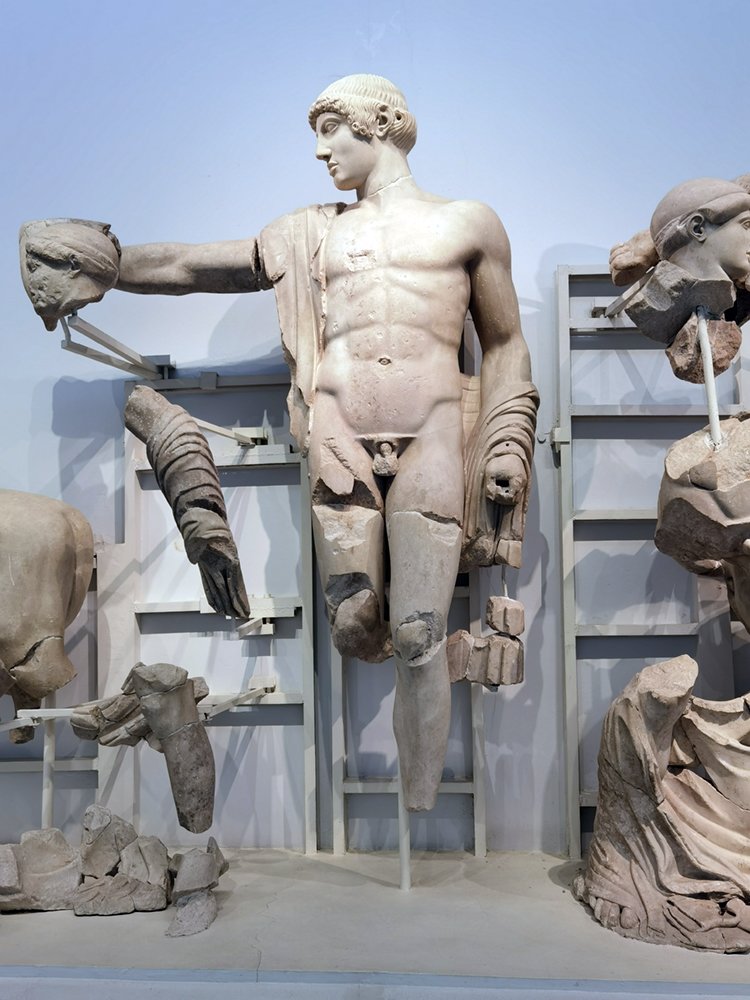
Apollo
Museum of the History of the Ancient Olympic Games
Housed in a historic building that was once the archaeological museum it focuses on the history of the Olympic Games, the athletes, and the sports. It doesn't have that many exhibits, I would say that they are more of an accompaniment to the texts so that you get a complete picture.
The texts provide information about the myths of the beginning of the Games, the organization, the preparation of the athletes, the Sacred Procession, the events, the Heraia, the women who attended the events, the Hellanodices, the Olympic champions and finally the oblivion that followed.
Although what is presented is very interesting I believe that the texts are an outdated way of presentation and should be replaced with audiovisual material.
My impressions
I left my personal impressions for the end. It is rather interesting for children and for you if you like visiting archaeological sites. I didn't get tired at all and I toured with great interest to see all these exhibits and sights that I know from history textbooks.
The sculptures, in addition to being well-known, are also so impressive that my children and I spent a lot of time studying them and of course taking smiling poses for photos like everyone else.
It is better to visit any time of the year except summer because the heat makes it difficult to tour.
Map
Here is a map with the sights I mention.













